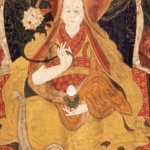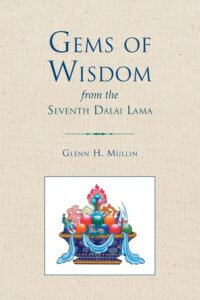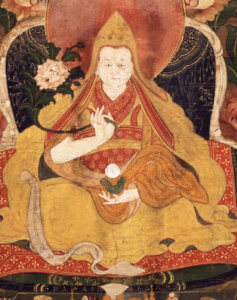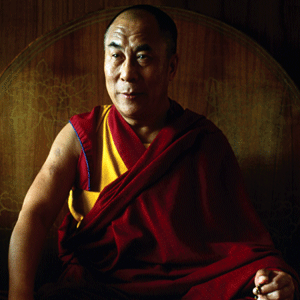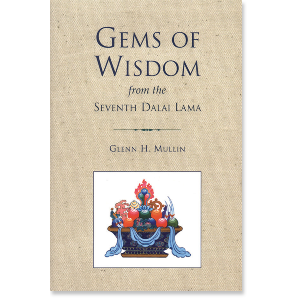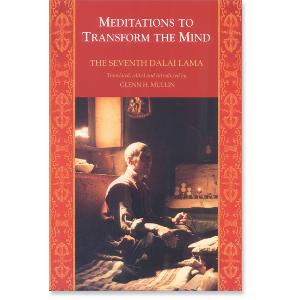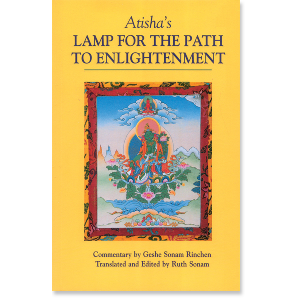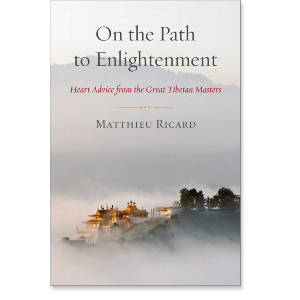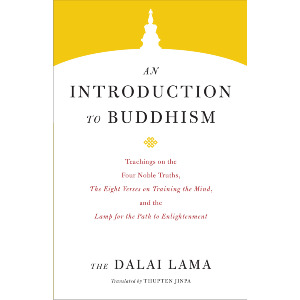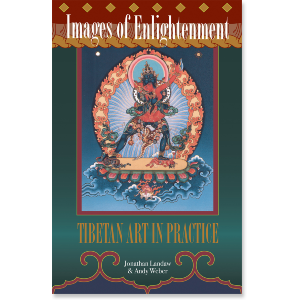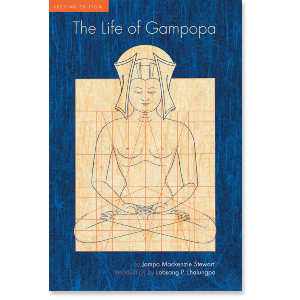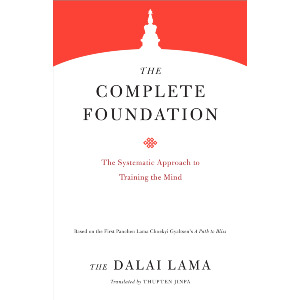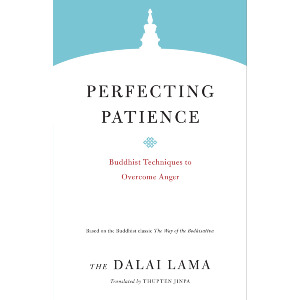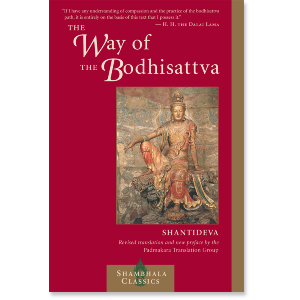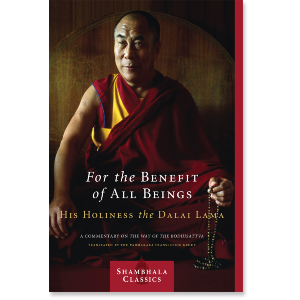| The following article is from the Autumn, 1999 issue of the Snow Lion Newsletter and is for historical reference only. You can see this in context of the original newsletter here. |
Gems of Wisdom
from the Seventh Dalai Lama
Translated by Glenn H. Mullin
The Seventh Dalai Lama (1708-1757) stands as one of the most beloved Buddhist masters in Tibet's long and illustrious history.
One of his most popular works is Gems of Wisdom, a collection of spontaneous short verses that employ earthy metaphors to illustrate key points in the enlightenment tradition. His language is simple and direct, capturing the profound spirituality of his vision while avoiding any form of religiosity. Here we find all the teachings of the Buddha brought into the context of their implications for individual transformation, or training of the mind.
Buddhism regards the human world as a training ground for the enlightenment process.
This volume presents a translation of this important text and also provides a brief commentary which elucidates the quintessential meanings embedded in the Seventh Dalai Lama's verses.
Glenn H. Mullin studied Tantric Buddhism in the Himalayas for twelve years, and has over a dozen books in print. In addition to his writings, he has co-produced numerous recordings of Tibetan sacred music, and also worked on three feature-length documentary films and four television productions related to Tibetan Buddhism.
Excerpt from Gems of Wisdom:
What is the body odor
easy to acquire but hard to lose?
Habits picked up from people
whose lives are far from spiritual ways.
The present era is called kaliyuga, or the dark age, for in it we are confronted by five harsh conditions: life-force is weak; delusions and afflicted emotions predominate everywhere; the times are violent; the living beings presently incarnate are mostly of low character; and false ideas and attitudes are mistaken for truth.
Buddhism regards the human world as a training ground for the enlightenment process. Living beings take rebirth here in order to learn and evolve. The conditions of the human environment change with the millennia in order to suit the needs of the trainees. Those riding the winds of positive karma are born as humans in a particular time and place in order to meet with those conditions most appropriate to their needs.
The present era is called kaliyuga, or the dark age, for in it we are confronted by five harsh conditions: life-force is weak; delusions and afflicted emotions predominate everywhere; the times are violent; the living beings presently incarnate are mostly of low character; and false ideas and attitudes are mistaken for truth. As a result, human civilization is filled with social structures, philosophical attitudes and behavioral norms that are in direct contradiction to and obstructive of spiritual growth.
Human civilization is filled with social structures, philosophical attitudes and behavioral norms that are in direct contradiction to and obstructive of spiritual growth.
On the positive side, the smallest point of light is clearly visible simply because everything is so dark, just as a candle flame in the daylight is almost invisible but at night is clearly seen from a great distance. Similarly, those born in the kaliyuga who enter into the path of spiritual knowledge quickly achieve their goals, for the steps on the path are easily distinguished.
The biggest obstacle to enlightenment in the kaliyuga is the temptation to follow the norms of society, for society is mostly on the wrong track. Therefore when the eleventh-century Kadampa master Lama Drom Tonpa was once asked how best to follow the path of spiritual knowledge he replied,
The masses have their heads on backwards. If you want to get things right, first look at how they think and behave, and consider going the opposite way.
the smallest point of light is clearly visible simply because everything is so dark...
Who suffer most deeply of all the beings in the world? Those with no self-discipline who are overpowered by delusion.
Generally speaking a person is always in one of two types of mind states: shen-wang, or other-powered and rang-wang, or self-powered. The former refers to the times when we do not keep the mind in positive spheres, and consequently are driven by distorted emotional or cognitive states; the latter refers to when we keep the mind focused through the application of spiritual methods.
It could also be said that there are two types of living beings: those who are directed mainly by negative mind states, and thus are mainly other-powered, and those who are directed mainly by spiritual forces, and thus are mainly self-powered. The second of the two have eliminated the coarse delusions and afflicted emotions, and have aroused the innate seeds of wisdom. Thus they hold the reins of their destiny in their own hands.
those who are directed mainly by spiritual forces, and thus are mainly self-powered (and) hold the reins of their destiny in their own hands.
Distorted mind states and afflicted emotions are the principal inner agents giving rise to external courses of action that create unhappiness for self and others. Due to anger, attachment, jealousy, prejudiced attitudes and so forth we misjudge the dynamics of the moment and mistake the flow of energies that constitute the transformations of body, speech and mind.
The remedy is the taming of the negative mind and the arousal of wisdom. However, these goals are not easily or quickly accomplished. Therefore those who have taken up the enlightenment path rely upon self-discipline. We cannot always have the wisdom to be free of anger, but through the will-power of self-discipline we can refrain from acts based on anger. Similarly, we may not yet have the wisdom that is free from prejudices, but we can discipline ourselves to mind our own business.
The remedy is the taming of the negative mind and the arousal of wisdom.
Undeveloped beings are almost always in a state of shen-wang. The more developed we become, the less time we spend in shen-wang states, and the more time in rang-wang, until eventually we achieve the transcendental wisdom that keeps us eternally in rang-wang.
Excerpt from Gems of Wisdom:
What is like a smelly fart
that, although invisible, is obvious?
One's own faults, that are precisely
as obvious as the effort made to hide them.
Ordinary people try to hide their faults and show what they think of as their good qualities. However, the more we try to hide a fault the more pronounced it becomes. The only remedy is the transcendence of the fault. As long as it still holds sway over us it is definite that it will continue to manifest.
The only remedy is the transcendence of the fault. As long as it still holds sway over us it is definite that it will continue to manifest.
The first step in overcoming our faults is the arousal of the determination to face and acknowledge them when they appear. Ordinary beings don't do this, and instead try to hide them from both self and others.
Of course, not everything that causes us embarrassment is a fault to be transcended. Ordinary social conditioning sometimes makes us ashamed of things of which we should be proud, and proud of things of which we should be ashamed. For this reason it is important to examine one's situation closely and not just take one's spiritual tradition for granted. But when it looks like a fault, smells like a fault and feels like a fault, most probably it is a quality to leave behind.
The early Kadampa lamas likened the Dharma to a mirror, and said that the practitioner should look at his or her face in this mirror and then clean it up in accordance with what is seen.
Excerpt from Gems of Wisdom:
What is an auspicious omen in country and city dweller alike?
Love, that seeks harmony amongst people,
and that wishes only happiness for others.
The term that the Seventh Dalai Lama uses here for harmony is puntsun yitu ongwa, which literally means seeing one another with affection. The yitu ongwa segment of the expression literally means delighting the mind, and is likened to the way a mother reacts to seeing her only child. The mere sight of the child brings pleasure and joy to the mind of the mother.
The presence of love in the mind immediately pacifies whatever negative energy is present in one's environment.
The quality of mind that always delights in the company of others, and that only wishes them well, is an auspicious omen in a person. Just as an auspicious omen seen in cloud formations, dreams or the like is a prophecy of good things to come, the quality of mind that always looks on others with affection and sympathy is an indication that the possessor of that mind is destined for happiness. When one has established the mind that always looks on others with love, one's experience of the world becomes more loving, peaceful and fulfilling.
The Buddha said,
The presence of love in the mind immediately pacifies whatever negative energy is present in one's environment. The force of the delusions is weakened, and the iron grip of negative karma is loosened.
Excerpt from Gems of Wisdom:
What is the one root of all
goodness in samsara and nirvana?
The clear light of one's own mind,
which by nature is free from every stain.
The basis of all conscious life is the mind, with its twofold quality of radiance and knowing. On its most subtle level, the mind is pure luminosity, or primordial clear light. Maitreya likened this aspect of the mind to the sky; the clouds of distortion and the delusions move through the sky and sometimes even obstruct the light of the sun, but they cannot actually harm or stain the sky. When conditions change, the clouds disappear and the pure sky shines through in all its glory.
Even the most seemingly evil person has the primordial clear light mind at the heart of his or her existence.
The essential nature of mind is equally pristine in all living beings, from earthworms to Buddhas. However, those on basic levels of consciousness fall prey to the distortions and delusions because of misapprehending the nature of the self. Moved by these factors they engage in negative behavior and bring suffering to self and others. Even the most seemingly evil person has the primordial clear light mind at the heart of his or her existence. Eventually the clouds of distortion and delusion will be cleared away as the being grows in wisdom, and the evil behavior that emanates from these negative mindsets will naturally evaporate. That being will realize the essential nature of his or her own mind, and achieve spiritual liberation and enlightenment.
The Buddha said,
The world is led by the mind. All good and evil deeds are created by it. It revolves like a fire wheel, moves like waves, burns like a forest fire, and widens like a great river.
As His Holiness the present Dalai Lama once put it,
The clear light mind, which lies dormant in living beings, is the great hope of mankind.

